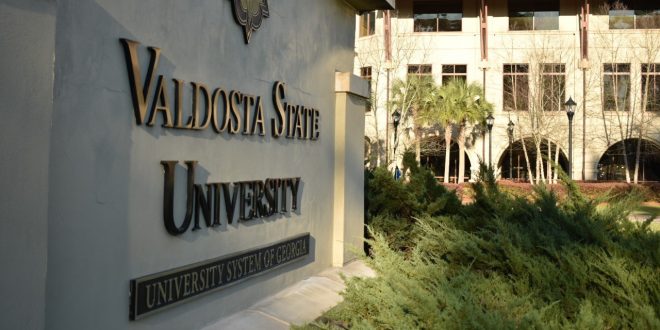The usual narrative of college places students in a “choose-your-own adventure” pathway, making them the writers of their stories, but last fall that changed. Now, VSU is taking the reins of students’ stories.
In Dr. Ted Geltner’s Reporting class (JOUR 4550) Dr. Richard Carvajal, VSU president, gave a short form “state of the university address” to the class’ student journalists. But while it was a contained event, Carvajal had much to say on VSU’s behalf.
Taking up topics regarding the progress of the Strategic Plan, Carvajal told the class VSU is requesting $18 million for a new Fine Arts theatre to replace Ashley Cinemas, making progressive growth in student population and, most importantly, evaluating retention or rather how to keep and increase student population.
But why is this important? Well, VSU is still reeling from the dramatic decrease in student population that started after the 2011 fall semester, which had 13,089 students. Take a look at the fall 2017 semester and you’ll see VSU had 11,341 students.
The one-year retention rate in 2011 was 67.4 percent while in 2017 it was 65.2 percent. In between those years, the average one-year retention rate was 68.7 percent—the same rate as 2016’s—with rates ranging from 68.9 to 70.9 percent.
The University System of Georgia, the entirety of Georgia’s college system, had an average one-year retention rate of 78.3 percent with rates ranging from 78.9 to 80.9 percent.
So, even with a 9.6 percent difference, VSU has a failing grade in its retention rate while USG has a “C,” at least according to academia. Take a glance at it, however, and it doesn’t seem bad.
VSU’s 2017 retention rate may have been the lowest out of comprehensive universities, like Georgia Southern and Kennesaw State, but the rates over the years haven’t changed too much for better or for worse.
Perhaps that’s the problem. Things aren’t changing.
“That was not a new challenge,” Carvajal said. “We took [it] on and are very pleased to say, this spring, for the first time in multiple years, we have seen our headcount here at VSU increase and we believe that is the beginning now of a positive trend of slow progressive growth for the next few years.”
“It” is the Momentum Year, a statewide effort connected to former Governor Nathan Deal’s “Complete College Georgia initiative.
According to VSU’s November 26 press release, the Momentum Year “focuses on encouraging first-year students to start their college career with a purposeful choice in a focus area or major, enter with a growth mindset, and follow a clearly sequenced program map.”
Because of this, which Carvajal announced to the class, VSU will no longer allow students to declare themselves “undecided.” Students without a major will tell their advisers what their interests are—their dream job, essentially—and will be placed on a focus area from there.
Focus areas include business, education, social sciences, health professions, humanities, applied technology, arts, and science, technology, engineering and math.
Sounds good, sure, but when asked if this decision affects students’ ability to choose their college path, Carvajal said yes. According to a survey by “Complete College America,” students want the exact opposite.
“If you’d said you can take all these different [classes/majors] it was too confusing,” Carvajal said. “The more choice you took away, the more you made the path better defined.”
This VSU-written narrative will call for students to take 30 credit hours which should include nine hours of major classes and a core math or English course.
It’s a “pilot exploratory effort” that Carvajal said will increase retention by 17 percent and increase the likelihood to graduate by 20 percent.
“We’re listening to our students,” Carvajal said. “We’re listening to the direction they’ve given us.”
So with the facts presented to you, you decide: Is this what you, the student, decided or is this what the university decided for you?
Story and photo by Bryce Ethridge, Content Editor.
For more News, click here
 The Spectator The independent student newspaper of Valdosta State University
The Spectator The independent student newspaper of Valdosta State University







